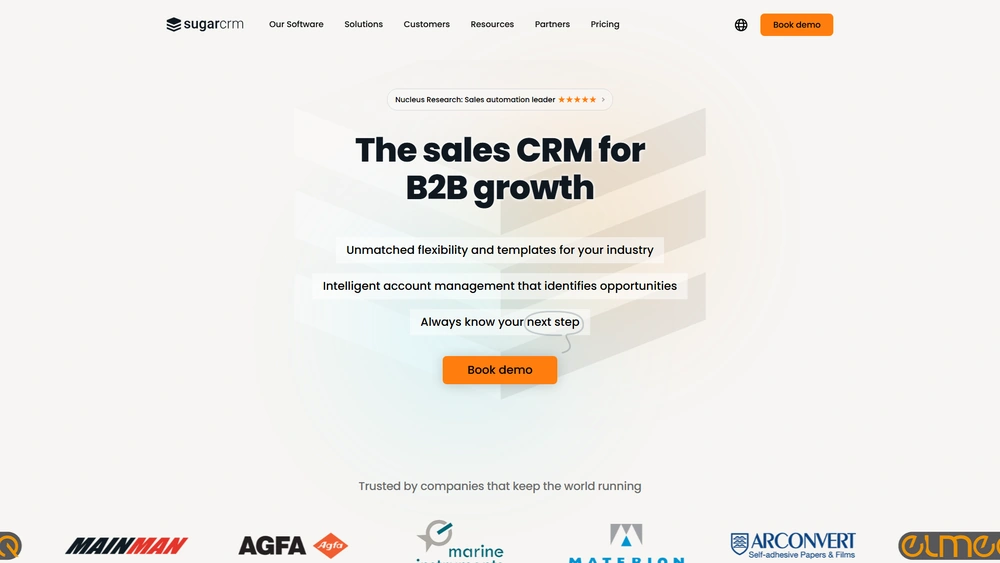SugarCRM Overview & 2026 Industry Position
SugarCRM has long carved a niche for itself in the vast CRM ecosystem, delivering intelligent customer experience tools for sales, marketing, and service teams. As we step deeper into 2026, SugarCRM’s adoption of predictive AI, low-code configuration, and contextual automation significantly elevates its value. The result? Businesses now enjoy faster ROI, gentler learning curves, and richer automation without sacrificing flexibility or data control. Compared to Salesforce and Microsoft Dynamics, SugarCRM stands out with its operational transparency, no-silo framework, and true platform customizability.
From Launch to 2026: SugarCRM’s Journey
Founded in 2004 as a pioneering open-source alternative to enterprise CRM systems, SugarCRM quickly gained traction among SMBs seeking customization at a lower cost. Key historical milestones include:
- 2004: Launch of the Sugar Open Source platform
- 2007: Release of commercial editions; shift to SaaS
- 2014: Discontinuation of open-source edition; company refocuses on enterprise
- 2019: Acquisition of Salesfusion and Node.io, boosting marketing and AI
- 2022: Introduction of SugarPredict, AI-based lead scoring & insights
- 2024: Launch of platform-wide analytics and idle-process automation
2026 Strategy: SugarCRM is centering around a unified AI-CX framework, enabling proactive customer lifecycle management with minimal user friction and full-stack visibility.

SugarCRM Key Features
SugarCRM’s suite spans sales automation, marketing orchestration, customer support, and embedded analytics—all unified under the Sugar platform. Here are standout features across its cloud platform:
- Sugar Sell: Sales automation with intelligent lead prioritization
- Sugar Market: Campaign builder, lead scoring, and nurture automation
- Sugar Serve: Omnichannel case management for support reps
- SugarPredict: AI-driven insights integrated across products
- SugarOutfitters: Extensive marketplace for add-ons and custom modules
- Low-code Studio: GUI-based configurations for fields, layouts, logic
- 360º View: Unified data layout showing real-time customer status
Workflow & UX
SugarCRM’s interface feels clean, modular, and visual-first. Unlike some of its competitors that overwhelm users with overly dense dashboards, SugarCRM prioritizes contextual displays based on user role, sales stage, or priority queue. The guided workflows auto-trigger based on triggers such as lead score thresholds, support queue assignments, or inactivity. Its mobile app experience mirrors the web version, and users consistently praise the system’s speed and logical layout.
SugarCRM Pricing Analysis & Value Metrics
As of July 2026, SugarCRM offers modular pricing across four main product bundles. All plans align to user-count thresholds and included features. Key plans include:
| Plan | Target | Price/user/month | Key Inclusions |
|---|---|---|---|
| Sugar Sell | Sales teams | $60 | Lead/opportunity mgmt, AI scoring, reports |
| Sugar Serve | Support teams | $80 | Case routing, SLA dashboards, omnichannel |
| Sugar Market | Marketers | $1,000*/mo | 10K contacts, Nurture, Emails, Campaign ROI |
| Sugar Enterprise (Platform) | Custom solutions | $85 | All core features + customization toolkit |
*Pricing scales by 10,000 contacts
Value Insight: SugarCRM is generally more cost-efficient at scale vs. Salesforce, especially for organizations preferring custom deployments and deeper data visibility without premium modules.
Competitive Landscape
SugarCRM competes with both cloud-native and highly customizable platforms. Here’s how it compares:
| Platform | Best For | Strength | Notable Weakness |
|---|---|---|---|
| Salesforce | Enterprise ecosystems | App marketplace, integrations | Complex user setup, expensive tiers |
| HubSpot | Startups, SMBs | User-friendly UI | Limited custom logic |
| Zoho CRM | Value-driven SMBs | Broad suite; low pricing | Disjointed product ecosystem |
| SugarCRM | Scaling mid-enterprise | Deployable flexibility + AI CX | Initial setup learning curve |
SugarCRM Integrations
SugarCRM supports a growing ecosystem of pre-built and API-powered integrations. These span sales, marketing, commerce, and productivity. Common integrations include:
- Office 365, Gmail, and Exchange (email sync + calendar)
- Slack, Zoom, Teams (collaboration)
- QuickBooks, Xero (finance)
- Mailchimp, Constant Contact (marketing)
- Shopify, WooCommerce (eCommerce platforms)
Via SugarOutfitters, users can access hundreds of modules in categories like quote management, SMS marketing, VoIP, or logistics sync.
Pros & Cons
- Pros:
- AI-native toolset across modules
- Flexible, low-code customization via Studio
- Clean UX with intelligent automation logic
- 100% transparent data ownership
- Cons:
- Requires configuration for first-time deployments
- Upfront learning curve for Studio setup
- Certain analytics modules cost extra
Use Cases
SugarCRM serves mid-sized enterprises especially well in these scenarios:
- Manufacturing CRM: Map account-based sales cycles, inventory-share workflows
- Insurance & Finance: Run compliance-based 360º client lifecycle tracking
- SaaS & Tech Firms: Accelerate MQL→SQL pipeline optimization
- Higher Education: Support student enrollment CRM across departments
Pro Tip: Use SugarPredict to assign AI-driven lead scores inside workflows triggered by behavioral CRM responses—it reduces human error while extending cycle visibility.
Final Thoughts
If your company is scaling and values deep customer data insights matched with custom workflows, SugarCRM deployment is a compelling choice in 2026. Consider it a growth-ready CRM engine—with intelligent actions and ownership flexibility—that avoids vendor lock-in while offering high extensibility. For those who prioritize agility without bloated pricing models, SugarCRM suite earns a top-tier spot.
SugarCRM FAQ
SugarCRM offers more control over customization, less cost layering, and a unified AI experience without locked modules or complex licensing tiers.
Absolutely; it’s designed to support SMB startups through mid-sized companies moving into enterprise needs—all with flexible cloud or on-prem deployment options.
SugarCRM offers a 7-day free trial on most products and demo access of key modules; however, it does not have a free-forever tier.
Yes. All paid SugarCRM plans include REST API support, webhook capability, and access to the Sugar Developer Hub.
SugarCRM allows full customer data ownership, complies with GDPR and CCPA, and enables on-premise data hosting if needed.

